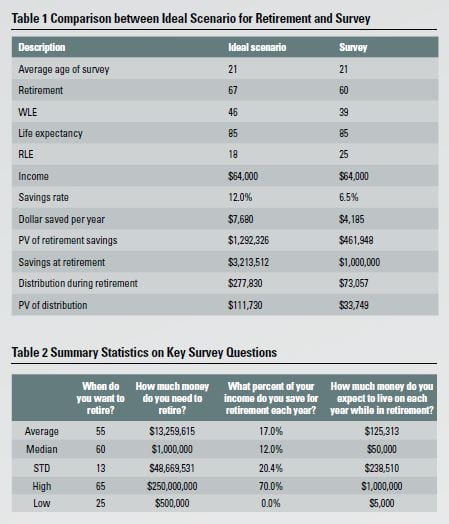Sarah Pulkowski
President, Towson University Investment Group
Jacob Piazza
Portfolio Manager, Towson University Investment Group
Keyur Patel
Vice-President, Towson University Investment Group
Aleksandr Olshanskiy
Compliance Officer, Towson University Investment Group
Introduction
The Towson University Investment Group (TUIG) conducted
a survey concerning the extent to which Towson
University students have knowledge of retirement and
financial planning concepts. Basic demographic and education-
related information was first queried, followed
by retirement planning and respondents’ knowledge
of available financial instruments. In total, we had
26 respondents. With the existing macroeconomic
backdrop as it currently stands – divergence between
the S&P 500 and SMID cap equities, and treasuries
at an all-time low after accommodative actions by the
Fed – retirement planning, we surmised, is especially
important for new college graduates. Key questions
in the survey included: When do you want to retire?
How much do you need to retire? What percent of
your income do you save for retirement each year?
How much money do you expect to live on each year
while in retirement?
Towson University is composed of the following colleges:
College of Business & Economics (CBE), College
of Health Professions (CHP), Jess & Mildred Fisher
College of Science & Mathematics (FCSM), College
of Liberal Arts (CLA), College of Fine Arts & Communication
(COFAC), and College of Education (CE).
The students questioned were segmented by college.
Allowing for inter-college and intra-college comparisons.
In addition to segmenting students by college,
we also segmented students by major. We conducted
the survey in October 2020. With the results of the
survey, we were able to show how Towson University
students are preparing for retirement, and their overall
knowledge of retirement.
Participant Background
The demographics data from our respondents indicates
no particular skew to any given population; 53.6% of
our participants are between 20-21, while 53.6% are
male. In terms of ethnic distribution, respondents were
28.6% Black/African American and 32.1% Caucasian,
with the remainder being distributed between Hispanic,
Asian, and Native American ethnic groups. We saw a
moderate skew towards older students, with more than
80% of respondents having more than 60 credits (Junior
and Seniors), which we believe is more applicable to our
initial goal of evaluating college graduates’ knowledge
of retirement planning concepts.
In seeking to evaluate the sources of retirement planning
knowledge, and the potential impact of education
by parents, we asked respondents the extent of their
parents/ education. More than 80% of respondents’
parents have earned undergraduate degrees or gone on
to complete post-graduate education, while only 15%
of respondents’ parents had high school diplomas. As
graduates of higher education make, on average, more
income than those having only graduated high school,
we concluded that respondents had a clear skew towards
belonging to middle to higher income households. As
for respondents’ employment, more than 70% were
employed or interning in some capacity. Of the 70%
employed, the majority were employed for wages, either
salaried or paid by the hour.
While students from every college were among the
respondents (save Education), there was a preponderance
of students from the College of Business &
Economics (CBE). Over 15 students from CBE answered
our survey, the majority of which are majoring in
Finance or Financial Planning. The average GPA for
respondents was 3.25, with a range between 2.1 and 4.0.
Retirement Planning
Of our samples, 21.4% of respondents stated they
plan to retire at the age of 65. The average and median
planned retirement age, 55 and 60 years old, respectively,
indicated that, on average, students planned to
retire five years or more before the full retirement age.
Despite the full retirement age for individuals born
after 1960 increasing to 67, TU students plan to retire,
on average, at 55 years of age. TU students’ average
planned retirement age is also 7 years before they are
entitled to begin receiving social security payouts. At
age 62, the earliest that an individual can receive social
security benefits, only 70% of the social security benefits
are received. By retiring early, the accumulation period
is reduced while the distribution period is increased,
creating the real risk that a retiree will outlive their
retirement savings. Table 1 presents a comparison
between the ideal scenario for retirement planning and
the situation based on our survey.

We report the summary statistics of key survey questions
in Table 2. The median and average savings respondents
indicated as being sufficient for retirement were
$1,000,000 and $13,300,000, respectively. As far as
yearly cash flow needed in retirement, on average
respondents stated that they would need $125,000 in
retirement. These numbers conclude that students need
to make sure they create or have a long-term retirement
plan created that is updated and monitored for them
to achieve retirement success.
Towson University’s Financial Planning coursework
teaches basic calculations required for retirement planning.
If a person states to save early in life for retirement,
with an appropriate savings rate, they can accumulate
enough savings for a comfortable retirement. The ideal
scenario’s saving rate for a person in their early twenties
is 11%-13%.
With answers varying from $500,000 to $20,000,000,
students have a wide range of expectations for savings
required to retire. The majority of the respondents said
they will save $1,000,000 in preparation for retirement.
With the assumption of 2% inflation and 8% annual
return on the investment, this gives inflation adjusted
return of 5.88% during their retirement. Based on
the previous assumptions, if they save $1,000,000
by the time they retire, individuals will have $73,057
of annual distributions from their portfolio during
retirement. The present value of the expected annual
spending is $33,749. This return is based on aggressive
investing even during retirement. These calculations
should be reviewed with consideration that a modest
change in inflation, retirement life or return on the
portfolio will have dramatic effect on the disposable
income of a retiree.
Additionally, 10.7% of students have not saved anything
for retirement. Since reviewing the survey results and
expectations of retirement income, we see that most
students are not seriously preparing for retirement.
Standard guidelines of financial planning state that,
in order to retire, one must save at least 10% of their
annual income.
In addition to consistently saving income, retirement
account strategies should be considered while planning
for retirement. We surveyed students on their expectations
regarding tax rates and their knowledge on the
relation between tax and social security. Overall, students
predict an increase in taxes due to inflation and
the overall long-term impacts of Covid-19. Students
at Towson University have a broad understanding
of how this government funded retirement program
works, perceiving it to be the following1: “Social Security
is government provided disability and retirement
income. For most citizens, after the age of 75, one can
receive social security. Before then, social security taxes
6.2% are taken out of each paycheck for employed
individuals. It is a form of compensation for older
citizens, citizens with disabilities, and citizens that
are widow(er)s.” Social security benefits, in actuality,
can be received as early as 62 (with penalties), and by
67 without penalties. Each individual’s social security
benefits vary depending on how much they earned and
how long they contributed to social security. 14 out of
26 respondents (53.9%) were able to correctly answer
basic questions regarding Social Security, while the
remaining had no knowledge or with misconception.
Though many students do not have a complete knowledge
of retirement, nor have they adequately planned
for retirement, 76% of students indicated that they will
seek financial planning advice in the future. Seeking the
advice of a Financial Professional will help to ensure that
one will be able to enjoy their golden years and possibly
extend the number of golden years an individual may
enjoy. The answers provided by students demonstrate
that those who are studying finance related subjects
have an excellent understanding of Social Security,
Retirement Planning, and Alternative Investments. The
survey conducted by the Towson University Investment
Group finds that Towson University is producing individuals
who are capable, well educated, and aware of
the current economic and financial market conditions.
Towson University is producing individuals who can
network and rely on each other to meet the demands
of knowledge that all aspects of life require, including
financial planning and retiring.
1Definition was created by compiling the correct or partially correct
answers from respondents.
